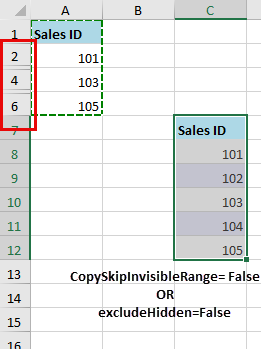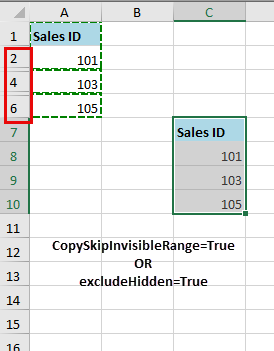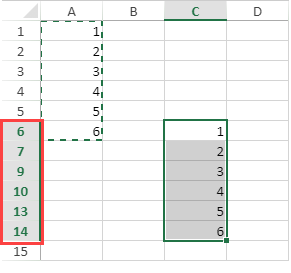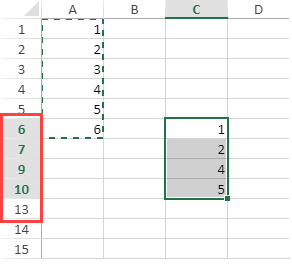-
Spread Windows Forms Product Documentation
- Getting Started
-
Developer's Guide
- Understanding the Product
- Working with the Component
- Spreadsheet Objects
- Ribbon Control
-
Sheets
- Working with the Active Sheet
- Working with Multiple Sheets
- Customizing the Sheet Name Tabs
- Navigating Sheet Tabs
- Adding a Sheet
- Adding ChartSheet
- Removing a Sheet
- Showing or Hiding a Sheet
- Moving a Sheet
- Selecting Multiple Sheets
- Copying and Inserting a Sheet
- Protecting a Worksheet
- Form Controls
- Adding a Title and Subtitle to a Sheet
- Placing Child Controls on a Sheet
- Displaying a Footer for Columns or Groups
- Adding a Tag to a Sheet
- Working with 1-Based Indexing
- Customizing Clipboard Operation Options
- Rows and Columns
- Headers
- Cells
- Cell Types
- Data Binding
- Customizing the Sheet Appearance
- Customizing Interaction in Cells
- Tables
- Pivot Table
- Understanding the Underlying Models
- Customizing Row or Column Interaction
- Formulas in Cells
- Sparklines
- Keyboard Interaction
- Events from User Actions
- File Operations
- Storing Excel Summary and View
- Printing
- Chart Control
- Enhanced Chart
- Customizing Drawing
- Touch Support with the Component
- Spread Designer Guide
- Assembly Reference
- Import and Export Reference
- Version Comparison Reference
Customizing Clipboard Operation Options
There are several Clipboard operations (such as copy, cut, and paste) that are automatically set for a sheet with default settings; they are built-in to Spread. But Spread also gives you the ability to customize these operations on actual applications that you develop, depending on your specific needs. You can customize how the user can interact with the contents of the Clipboard when users perform copying and pasting actions in cells in the spreadsheet. You can implement those operations at your discretion in code. These customizations include:
Deactivating clipboard operations
Excluding headers from clipboard operations
Obtaining the clipboard contents
Deactivating pasting
Changing the scope of pasting
Disabling Copying in Invisible Cells
Disabling Pasting in Invisible Cells
Performing the clipboard operations in code
The following members are used to determine Clipboard-related interaction:
ClipboardOptions property (and ClipboardOptions enumeration)
AutoClipboard property
ClipboardCopyOptions enumeration
ClipboardPasteOptions enumeration
The spreadsheet methods in the SheetView class that involve Clipboard operation are:
ClipboardCopy, which copies the contents from the sheet to the Clipboard
ClipboardCut, which cuts the contents from the sheet to the Clipboard
ClipboardPaste, which pastes the contents from the Clipboard to the sheet
The corresponding shape methods in the SheetView class that involve Clipboard operation are:
ClipboardCopyShape, which copies the active shape to the Clipboard
ClipboardCutShape, which cuts the active shape to the Clipboard
ClipboardPasteShape, which pastes the shape from the Clipboard
If there are locked cells in the range to cut or paste then the Clipboard operation is not performed.
!type=note
Note: The .NET version of the product handles Clipboard operations differently from the way that the COM version does.
You can also set how some Clipboard-related features perform when the user is in edit mode in a cell on the Spread. You can set whether the pop-up menu appears while in edit mode within a cell using the AutoMenu property in SuperEditBase class and whether the user can perform Clipboard operations with the shortcut keys with the AllowClipboardKeys property in SuperEditBase class.
For more information about copying and pasting, see Copying Data on a Sheet.
Deactivating Clipboard Operations
You can set whether the shortcut keys are available to the end user for them to use to perform Clipboard operations by setting the AutoClipboard property in the FpSpread class. You can deactivate all the Clipboard operations with components by setting the AutoClipboard property to False in the FpSpread class. The default setting is True. You can deactivate some Clipboard operations such as pasting (Ctrl+V) by deactivating the input map definition for short-cut keys and Clipboard operations (Ctrl+C, Ctrl+V, and Ctrl+X).
Excluding Headers from Clipboard Operations
You can set whether to include headers when using Clipboard operations by setting the ClipboardOptions property in the FpSpread class and the ClipboardOptions enumeration. The default setting, AllHeaders, allows all headers to be included.
Obtaining the Clipboard Contents
Values which are copied on sheets are controlled by the Clipboard class which is provided from the .NET Framework. You can obtain Clipboard contents by using respective operations in this Clipboard class.
Cell data is copied onto the Clipboard in advance by calling ClipboardCopy method in the SheetView class at the Load event. Then, calling GetDataObject method enables you to obtain those Clipboard contents for use, such as for text format determination.
Deactivating Pasting
The ClipboardPasting event occurs when pasting is performed (Ctrl+V) on sheets. You can deactivate pasting by canceling this event under certain circumstances. You can prevent pasting by obtaining the timing when pasting is performed, and canceling the action.
Changing the Scope of Pasting
When cells are copied or cut to the Clipboard, all the data aspects including values, formats, and formulas, are available by default for pasting. You can configure to paste values only, for example, by changing the input map definitions. The default setting is ClipboardPasteAll, which enables pasting all the aspects of the data. The ClipboardPasteOptions enumeration allows you to set the scope of what is pasted when a Clipboard paste is performed by the user.
Disabling Copying in Invisible Cells
Spread enables you to skip invisible/hidden cells while copying a cell range along with their styles. This can be done in two ways:
Using the CopySkipInvisibleRange option of the Features class.
Using an overload of Copy method which accepts the excludeHidden parameter.
By default, both the CopySkipInvisibleRange option and the excludeHidden parameter are false. The skipping of invisible cells while copying range only takes effect when the RichClipboard is set to true and LegacyBehaviors.Style is excluded from LegacyBehaviors enum.
The image below illustrates the behavior of skipping invisible cells while copying.
|
|
|---|---|
The following code allows you to skip copying invisible cells by setting the CopySkipInvisibleRange option to true:
// Disable the LegacyBehaviors
fpSpread1.LegacyBehaviors = FarPoint.Win.Spread.LegacyBehaviors.None;
// Sets the RichClipboard property to true
fpSpread1.Features.RichClipboard = true;
SheetView sheet1 = fpSpread1.ActiveSheet;
IWorksheet sheet = fpSpread1.AsWorkbook().ActiveSheet;
// Skip copying invisible range using CopySkipInvisibleRange option
fpSpread1.AsWorkbook().Features.CopySkipInvisibleRange = true;
sheet1.Rows[2].Visible = false;
sheet1.Rows[4].Visible = false;' Disable the LegacyBehaviors
FpSpread1.LegacyBehaviors = FarPoint.Win.Spread.LegacyBehaviors.None
' Sets the RichClipboard property to true
FpSpread1.Features.RichClipboard = True
Dim sheet1 As SheetView = FpSpread1.ActiveSheet
Dim sheet As IWorksheet = FpSpread1.AsWorkbook().ActiveSheet
' Skip copying invisible range using CopySkipInvisibleRange option
FpSpread1.AsWorkbook().Features.CopySkipInvisibleRange = True
sheet1.Rows(2).Visible = False
sheet1.Rows(4).Visible = FalseThe following code allows you to skip copying invisible cells by setting the excludeHidden parameter of the Copy method to true:
// Disable the LegacyBehaviors
fpSpread1.LegacyBehaviors = FarPoint.Win.Spread.LegacyBehaviors.None;
// Sets the RichClipboard property to true
fpSpread1.Features.RichClipboard = true;
SheetView sheet1 = fpSpread1.ActiveSheet;
IWorksheet sheet = fpSpread1.AsWorkbook().ActiveSheet;
sheet1.Rows[2].Visible = false;
sheet1.Rows[4].Visible = false;
// Copy method returns true
sheet.Range("A1:A6").Copy(true, true);' Disable the Legacy Behaviors
FpSpread1.LegacyBehaviors = FarPoint.Win.Spread.LegacyBehaviors.None
' Sets the RichClipboard property to true
FpSpread1.Features.RichClipboard = True
Dim sheet1 As SheetView = FpSpread1.ActiveSheet
Dim sheet As IWorksheet = FpSpread1.AsWorkbook().ActiveSheet
sheet1.Rows(2).Visible = False
sheet1.Rows(4).Visible = False
' Copy method returns true
sheet.Range("A1:A6").Copy(True, True) Disabling Pasting in Invisible Cells
You can set whether to paste the clipboard values in invisible cells, rows, and columns by using the PasteSkipInvisibleRange option from the Features class. It accepts a boolean value and is False by default.
This option only takes effect when RichClipboard is set to True.
When PasteSkipInvisibleRange = True | When PasteSkipInvisibleRange = False (default value) |
|---|---|
|
|
The following example allows you to skip pasting the data in an invisible range.
fpSpread1.LegacyBehaviors = LegacyBehaviors.None;
fpSpread1.Features.RichClipboard = true;
fpSpread1.ActiveSheet.Rows[7].Visible = false;
fpSpread1.ActiveSheet.Rows[10, 11].Visible = false;
fpSpread1.AsWorkbook().Features.PasteSkipInvisibleRange = true;FpSpread1.LegacyBehaviors = LegacyBehaviors.None
FpSpread1.Features.RichClipboard = true
FpSpread1.ActiveSheet.Rows(7).Visible = false
FpSpread1.ActiveSheet.Rows(10, 11).Visible = false
FpSpread1.AsWorkbook().Features.PasteSkipInvisibleRange = truePerforming the Clipboard Operations in Code
Various methods are provided in the SheetView class for Clipboard processes. You can run them when you want. These include:
Enabling Multi-Range Selection for Copy/Paste
The RichClipboard property in the IFeatures interface indicates whether you can copy/paste data across multi-ranges. This property can be implemented with flat style mode only.

This multi-range selection for copy/paste option only takes effect when the RichClipboard property is set to true.
// Flat style
fpSpread1.LegacyBehaviors &= ~LegacyBehaviors.Style;
// Setting RichClipboard property
fpSpread1.Features.RichClipboard= true;' Flat style
FpSpread1.LegacyBehaviors = FpSpread1.LegacyBehaviors And Not LegacyBehaviors.Style
' Setting RichClipboard property
FpSpread1.Features.RichClipboard = TruePasting Special Cell Content
Spread allows you to copy and paste cell contents into a worksheet. When you use the Copy and Paste options, all attributes are copied by default.
Instead of a simple direct paste, you can also use the Paste Special to paste the contents of the clipboard in a specific way. It is particularly useful when you want to control how data is transferred from the clipboard into your worksheet. For example, you can use Paste Special to paste only values without formulas, to transpose data, or to include conditional formatting during the paste process.
Using code
The following example code shows how to paste cell content and formatting using the IRange.PasteSpecial API. Note that the RichClipboard feature must be set to True to select various pasting operations.
// Add cell content
fpSpread1.Features.RichClipboard = true;
fpSpread1.Features.EnhancedShapeEngine = true;
IWorksheet TestActiveSheet = fpSpread1.AsWorkbook().ActiveSheet;
TestActiveSheet.SetValue(0, 0, new object[,] { { 1, 2, 3, null, 5 } });
var rangeA1C1 = TestActiveSheet.Cells["A1:C1"];
rangeA1C1.FormatConditions.AddIconSetCondition();
var cmt = TestActiveSheet.Cells["E2"].AddComment("visible comment");
cmt.Visible = true;
var thread = TestActiveSheet.Cells["D2"].AddCommentThreaded("thread");
thread.AddReply("reply1");
thread.AddReply("reply2");
var cellB2 = TestActiveSheet.Cells["B2"];
cellB2.Borders.LineStyle = GrapeCity.Spreadsheet.BorderLineStyle.Thick;
cellB2.Borders.Color = GrapeCity.Spreadsheet.Color.FromKnownColor(GrapeCity.Core.KnownColor.Red);
// Copy and paste specific cell content
TestActiveSheet.Cells["A1:E2"].Copy(true);
TestActiveSheet.Cells["E8"].PasteSpecial(GrapeCity.Spreadsheet.PasteType.AllExceptBorders, GrapeCity.Spreadsheet.PasteSpecialOperation.None, false, false);' Add cell content
FpSpread1.Features.RichClipboard = True
FpSpread1.Features.EnhancedShapeEngine = True
Dim TestActiveSheet As IWorksheet = FpSpread1.AsWorkbook().ActiveSheet
TestActiveSheet.SetValue(0, 0, New Object(,) {
{1, 2, 3, Nothing, 5}})
Dim rangeA1C1 = TestActiveSheet.Cells("A1:C1")
rangeA1C1.FormatConditions.AddIconSetCondition()
Dim cmt = TestActiveSheet.Cells("E2").AddComment("visible comment")
cmt.Visible = True
Dim thread = TestActiveSheet.Cells("D2").AddCommentThreaded("thread")
thread.AddReply("reply1")
thread.AddReply("reply2")
Dim cellB2 = TestActiveSheet.Cells("B2")
cellB2.Borders.LineStyle = GrapeCity.Spreadsheet.BorderLineStyle.Thick
cellB2.Borders.Color = GrapeCity.Spreadsheet.Color.FromKnownColor(GrapeCity.Core.KnownColor.Red)
' Copy and paste specific cell content
TestActiveSheet.Cells("A1:E2").Copy(True)
TestActiveSheet.Cells("E8").PasteSpecial(GrapeCity.Spreadsheet.Past eType.AllExceptBorders, GrapeCity.Spreadsheet.PasteSpecialOperation.None, False, False)At Runtime
The following steps show how to use the Paste Special functionality at runtime.
Run the code below to load a spread control with the ribbonBar having RichClipboard property as True.
fpSpread1.Features.RichClipboard = true; ribbonBar1.Attach(fpSpread1);FpSpread1.Features.RichClipboard = True ribbonBar1.Attach(FpSpread1)Select the cell range that contains the data or other attributes that you want to copy.
On the Home tab of the ribbonBar, click Copy or press Ctrl + C key.
Right-click on the cell where you want to paste the copied data and select the paste options.
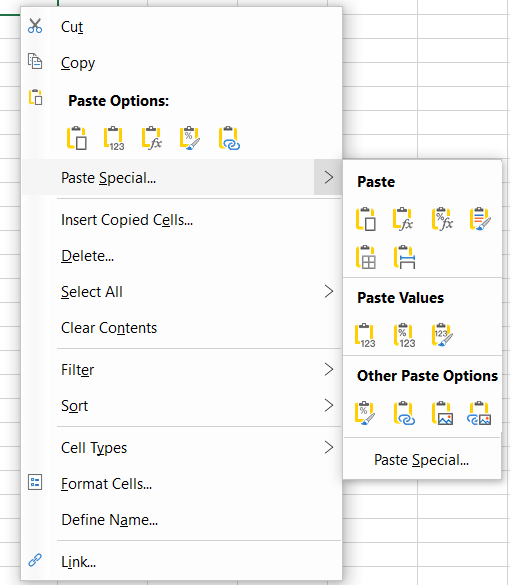
Select paste options by directly selecting the icons or by using the settings from the Paste Special dialog.
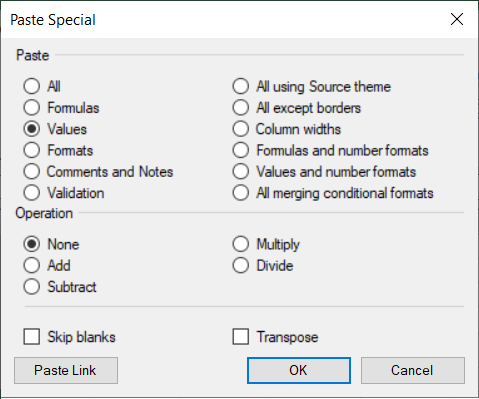
!type=note
Note:The options on the Paste menu will depend on the type of selected data. For example, if the target sheet has no conditional formatting, the option “Merge Conditional Formats” is not visible and is disabled on the Paste Special dialog.
Paste Menu Options
There are numerous options to paste copied cell data. The following are available paste menu options in Spread.
Select | To paste |
|---|---|
Paste | All cell contents and formatting, including linked data. |
Formulas | Only the formulas. |
Formulas & Number Formatting | Only formulas and number formatting options. |
Keep Source Formatting | All cell contents and formatting using the theme that was applied to the source data. |
No Borders | All cell contents and formatting except cell borders. |
Keep Source Column Widths | All cell contents and formatting and column widths. |
Transpose | Reorients the content of copied cells when pasting. Data in rows is pasted into columns and vice versa. |
Paste Values | Only the values as displayed in the cells. |
Values Number Formatting | Only the values and number formatting. |
Values Source Formatting | Only the values and number color and font size formatting. |
Formatting | All cell formatting, including number and source formatting. |
Paste Link | Link the pasted data to the original data. When you paste a link to the data that you copied, Excel enters an absolute reference to the copied cell or range of cells in the new location. |
Paste as Picture | A copy of the image. |
Linked Picture | A copy of the image with a link to the original cells (if you make any changes to the original cells those changes are reflected in the pasted image). |
Column widths | Paste the width of one column or range of columns to another column or range of columns. |
Merge Conditional Formatting | Combine conditional formatting from the copied cells with conditional formatting present in the paste area. |
Paste Special Options
Spread provides the following advanced Paste Special options.
Select | To paste |
|---|---|
All | All cell contents and formatting, including linked data. |
Formulas | Only the formulas. |
Values | Only the values as displayed in the cells. |
Formats | Cell formatting. |
Comments | Only comments attached to the cell. |
Validation | Only data validation rules. |
All using source theme | All cell contents and formatting using the theme that was applied to the source data. |
All except borders | Cell contents and formatting, except cell borders. |
Column widths | Width of one column or range of columns to another column or range of columns. |
Formulas and number formats | Only formulas and number formatting. |
Values and number formats | Only values and number formatting. |
All merging conditional formats | All cell contents and formatting. Combine conditional formatting from the copied cells with conditional formatting present in the paste area. |
Operation Options
The operation options mathematically combine values between the copy and paste areas. Note that Operations will be disabled when selected Paste Type is Formats, Comments and Notes, Validation.
Select | To paste |
|---|---|
None | Paste the contents of the copy area without a mathematical operation. |
Add | Add the values in the copy area to the values in the paste area. |
Subtract | Subtract the values in the copy area from the values in the paste area. |
Multiply | Multiply the values in the paste area by the values in the copy area. |
Divide | Divide the values in the paste area by the values in the copy area. |
Other options
The table below describes additional Paste Special options.
Select | To paste |
|---|---|
Skip Blanks | Avoid replacing values or attributes in your paste area when blank cells occur in the copy area. |
Transpose | Reorients the content of copied cells when pasting. Data in rows is pasted into columns and vice versa. Transpose is disabled if the copied range contains a sparkline. |
Paste Link | If the data is a picture, links to the source picture. If the source picture is changed, this one will change too. Note that the Paste Link button is enabled only if the following conditions are fulfilled:
|
Limitations
Paste Transpose, Column Widths, Operation, and Paste Link do not support the PasteSkipInvisibleRange property of the Features class.
The Paste menu on ribbonBar does not support Paste Special.



